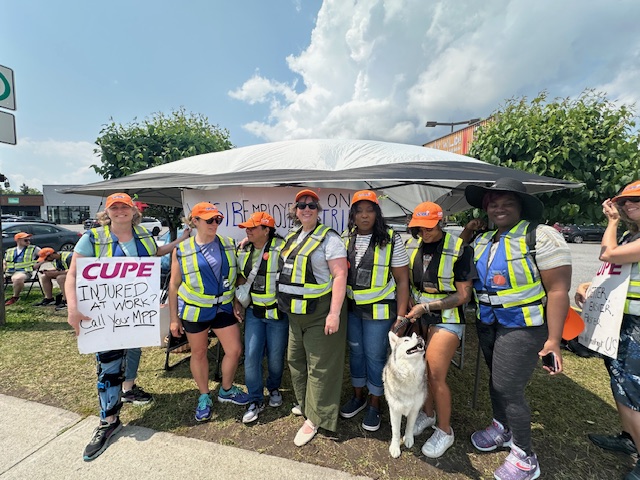The Ontario Federation of Labour (OFL) will release a report alleging that Ontario's Workplace Safety and Insurance Board (WSIB) ignores opinions and recommendations from some health care providers.
“This report confirms what injured worker advocates have been hearing for years – that the WSIB system is more interested in clearing its case load than supporting workers who have been seriously injured on the job,” said OFL secretary-treasurer Nancy Hutchison.
“These doctors are blowing the whistle on the WSIB’s punitive practice of ‘deeming’ injured workers eligible to resume work when their treating physicians and medical professionals have clearly stated the opposite. The report we are releasing today tells the story of these doctors and their patients. We hope it will force a formal investigation into the WSIB’s treatment of medical advice and lead to systemic change,” she said.
The report, called Prescription Over-Ruled: Report on How Ontario’s Workplace Safety and Insurance Board Systematically Ignores the Advice of Medical Professionals, was produced with the assistance of six registered psychologists who originally raised the alarm about the WSIB’s management of medical care and medical evidence as it relates to WSIB benefits recipients.
While the report was not discussed with the WSIB in advance, the board has responded by saying that it values the relationships it has with thousands of health care practitioners across the province and relies on their professionalism and expertise.
The board said that 92 per cent of injured workers are back at work within one year of their injury at full wages. Fewer than two per cent of claims are appealed, and in 2015, the fewest number of appeals were received since 1989.
Two significant scientific studies released earlier this year show that the system is working on behalf of injured workers.
The Work Injury and Poverty study by the Institute for Work and Health found "workers compensation benefits were an important part of the earnings that kept injured workers out of poverty."
Another study by the institute on benefit adequacy compared the earnings and benefits of a large group of injured workers with permanent impairments to the earnings of a comparable group of non-injured workers over a 10 year period.
The study found that the average earnings replacement rate for injured workers was 105 per cent of the non-injured worker group.
Essentially injured workers did better financially than the comparison group of non-injured workers.
For any injured worker who wishes to have a WSIB decision reconsidered, a two level appeals process exists, which includes the independent Workplace Safety and Insurance Appeals Tribunal as well as access to the Office of the Worker Adviser.
“This report confirms what injured worker advocates have been hearing for years – that the WSIB system is more interested in clearing its case load than supporting workers who have been seriously injured on the job,” said OFL secretary-treasurer Nancy Hutchison.
“These doctors are blowing the whistle on the WSIB’s punitive practice of ‘deeming’ injured workers eligible to resume work when their treating physicians and medical professionals have clearly stated the opposite. The report we are releasing today tells the story of these doctors and their patients. We hope it will force a formal investigation into the WSIB’s treatment of medical advice and lead to systemic change,” she said.
The report, called Prescription Over-Ruled: Report on How Ontario’s Workplace Safety and Insurance Board Systematically Ignores the Advice of Medical Professionals, was produced with the assistance of six registered psychologists who originally raised the alarm about the WSIB’s management of medical care and medical evidence as it relates to WSIB benefits recipients.
While the report was not discussed with the WSIB in advance, the board has responded by saying that it values the relationships it has with thousands of health care practitioners across the province and relies on their professionalism and expertise.
The board said that 92 per cent of injured workers are back at work within one year of their injury at full wages. Fewer than two per cent of claims are appealed, and in 2015, the fewest number of appeals were received since 1989.
Two significant scientific studies released earlier this year show that the system is working on behalf of injured workers.
The Work Injury and Poverty study by the Institute for Work and Health found "workers compensation benefits were an important part of the earnings that kept injured workers out of poverty."
Another study by the institute on benefit adequacy compared the earnings and benefits of a large group of injured workers with permanent impairments to the earnings of a comparable group of non-injured workers over a 10 year period.
The study found that the average earnings replacement rate for injured workers was 105 per cent of the non-injured worker group.
Essentially injured workers did better financially than the comparison group of non-injured workers.
For any injured worker who wishes to have a WSIB decision reconsidered, a two level appeals process exists, which includes the independent Workplace Safety and Insurance Appeals Tribunal as well as access to the Office of the Worker Adviser.





